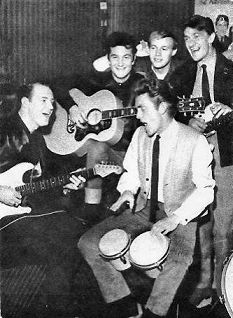 |
 |
 |
|
Shane with Lional Bart, writer of 1962's "Too Young for Sad
Memories". "Oliver" was not far away.
|
|
"Cindy's
Birthday" rose up the charts and breached the top twenty at no. 19
before inexplicably slipping slowly out again. It was
disappointing to all concerned that assured Top Ten material had in fact
missed out on that accolade, nevertheless, after an eight-week run it
was still his biggest chart hit to date.
The Fentones mustered another minor 'solo' chart entry shortly
after this with a revival of "The Breeze And I", a number recorded by
many others including the Shadows and the Tornados. The Fentones
actually beat the latter to the punch, their breathless performance
consigned to an EP release while their manager Joe Meek sought out
something else to record. Beat was beginning to loom on the
horizon and within eighteen months the face of first UK, then world pop
would be changed forever. Nobody at EMI knew this at the time, of
course, and after the pleasing trend of three increasingly successful
hits came the pleasant country-ish "Too Young For Sad Memories",
seen as a good bet for another hit. The Lional Bart (right, with
Fenton) penned ballad sounded like the kind of material Frank Ifield
was about to have major-league hits with ("I Remember You", "Don't Blame
Me"). The single, whose Rock-a-billy b-side, "You're Telling Me"
was notable for Shanes' over-dubbed 'call and response' vocal, escaped
in mid October to be promoted with more dates and - a big disappointment
for all concerned - missed the charts entirely. At least Bart -
who co-wrote Tommy Steele's 1956 then-revolutionary "Rock With The Cave
Man" and Cliff's 1959 "Living Doll" - would experience more success with
stage shows like the acclaimed "Oliver!", which is not bad for a man who
couldn't actually read music!
 |
|
As can be witnessed, Shane and the Fentones were being
promoted as separate enteties by 1963
|
|
In the
early part of 1963 the group were on tour, which featured Joe Brown and
the Bruvvers, The Tornados, Eden Kane, Peter Jay and the Jaywalkers and
one Rolf Harris who'd had big hits with the novelty "Tie Me Kangaroo
Down Sport" and the spiritual "Sun Arise". The inhabitants of
Scarborough, Yorkshire, were able to experience all this at the Futurist
Theatre for only six shillings and sixpence! Those were the days.
The Arena Ballroom featured Screaming Lord Sutch and the Savages, The
Brook Brothers and Freddie and the Dreamers, amongst others in the
three-hour-plus show. Fenton was promoting his new
single, the showy "I Ain't Got Nobody" coupled with "Hey
Miss Ruby", though this change in style without the Fentones
obviously present (at least on the topside) did not result in a hit.
The single later surfaced as Scopitone and Cinebox/Colorama Jukebox
films, these were primitive 1960's precursors to today's' ubiquitous pop
videos which played filmed performances of top hits on standalone units.
These originated on the continent and were therefore biased toward
European hits which part-explains why another Fenton title is also
listed on both these formats, which is otherwise unreleased in the UK at
least. "That Old Yeah Yeah Feeling" never made its way onto a UK
release but was covered in recent times by the Rapiers. Websites
with more information on these interesting machines can be found
here and
here. The first Fentone line-up change occurred when Tony
Hinchcliffe left for South Africa. His place was taken by American
George Rodda.
 |
|
Drummer Bobby Elliot (behind Shane) seen before he joined the
Hollies. |
|
On
18th April 1963 the Beatles appeared in a live concert at the
Royal Albert Hall for the first time, the second half of which was
broadcast live on BBC radio. Besides them plus Shane Fenton and
the Fentones, the all-star bill featured Del Shannon, the Springfields,
Lance Percival, Rolf Harris, the Vernons Girls, Kenny Lynch and Jazz
meister George Melly. All acts came together to sing "Mack The
Knife" in the shows Grand Finale, after which Shane drove John Lennon,
Paul McCartney, George Harrison and young actress Jane Asher over to
journalist friend Brian Hutchins' flat in Chelsea and Paul started
famously dating Asher soon after. Shane picked up with Paul's
ex-girlfriend Iris Caldwell, who was the sister of Merseyside favourite
Rory Storme - Ringo Starr had absconded from his band the Hurricanes to
join the Beatles in pop's most famous line-up reshuffle of all time just
the previous year. Shane and his band had played at the Tower
Ballroom in Liverpool where Iris worked as a dancer; they would be later
married.
Despite
all this going on it was time to get down to work and Shanes' next 45
rpm offering was penned by Eden Kane. "A Fools' Paradise"
was credited to Shane Fenton alone and fared little better than the
last. In the style it was recorded it may well have been chart
material just twelve months previously, but you have to wonder how it
would have turned out had the Fentones been on backing duties,
especially with the assured Elliot on drums. Indeed Shane's own
catchy composition "You Need Love" that adorned the flip sounded
more in keeping with the Merseybeat bursting out all around them.
Around this time Rodda left the Fentones, and Bobby Elliot had joined on
the understanding that this was a temporary posting before joining
fellow Parlophone signing the Hollies. The latter's original drummer Don Rathbone
would be
stepping down to become one of their road managers allowing the crisp
and technically-superior Elliot to join full-time. His replacement
in the Fentones was Don Burrell.
|
 |



